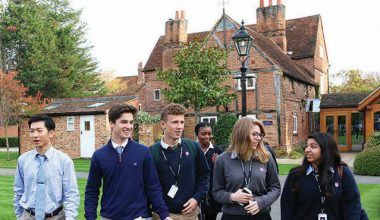The Midwest region of the United States is home to many outstanding colleges and universities, both big and small. At the same time, they may draw many students to the region’s more prominent institutions. The small Midwest colleges offer a unique educational experience.
These institutions prioritize close-knit communities, personalized attention from faculty and staff, and a strong focus on undergraduate education. This article will explore the best small Midwest colleges, highlighting their unique features, academic programs, and campus culture.
Whether you are a high school student just beginning your college search, or a transfer student looking for a more intimate educational experience, this guide will provide valuable insights into some of the top small colleges in the Midwest.

Table of contents
How To Apply For The Best Small Midwest Colleges
If you’re interested in attending one of the best small colleges in the Midwest, there are several steps you’ll need to take to apply.
Here are some general guidelines to keep in mind:
- Research schools: Start by researching the small colleges in the Midwest that interest you. Look at location, academic programs, campus culture, and extracurricular activities.
- Meet with your guidance counselor: Discuss your college plans with your high school counselor. They help you identify which schools are a good fit based on your academic record, interests, and career goals.
- Check application deadlines: Be sure to check the application deadlines for each school you’re interested in. Some schools may have early decision or early action deadlines earlier than regular decision deadlines.
- Complete your application: Once you’ve identified the schools you want to apply to, you must complete each application. It will typically include providing personal information, transcripts, test scores, essays, and letters of recommendation.
- Please submit your application: Once completed, submit it by the deadline. Some schools may require an application fee, so be prepared to pay that.
- Wait for a decision: After you’ve submitted your application, you’ll need to wait for a decision from each school. Some schools may require an interview or additional information before making a decision.
Overall, applying to the best small colleges in the Midwest is similar to any other college or university.
However, since these schools tend to be more selective and emphasize fit, it’s essential to do your research and put your best foot forward in your application.
10 Best Small Midwest Colleges In 2023
Here are the best small Midwest colleges
#1. Carleton College, Northfield, Minnesota
Carleton College is one of the best small Midwest colleges, if not the entire country. Founded in 1866, the college has its location in Northfield, Minnesota, about an hour south of Minneapolis.
Carleton is a highly selective institution, with an acceptance rate of around 19%, and its students consistently rank among the best in the nation in terms of academic achievement.
One thing that sets Carleton apart from other small colleges is its rigorous academic program. The college offers over 30 majors and 15 concentrations, with particular strength in the sciences, social sciences, and humanities.
All students must complete a comprehensive senior project, which allows them to apply their knowledge and skills to a real-world problem or question.
#2. Grinnell College, Grinnell, Iowa
Grinnell College is one of the best small Midwest colleges. Located in Grinnell, Iowa, it was founded in 1846 and had a long history of academic excellence and intellectual curiosity.
U.S. News & World have consistently ranked them among the top 20 liberal arts colleges in the United States the college Report.
Grinnell College’s academic program is renowned for its rigor and interdisciplinary approach. Students are encouraged to explore a wide range of subjects and to engage in original research and creative projects.
The college has a student-to-faculty ratio of 9:1, meaning students receive personalized attention and guidance from their professors.
The college offers many majors and minors in the arts, humanities, social sciences, and natural sciences.
Some of the most popular majors at Grinnell College include economics, political science, biology, psychology, and computer science. The college is also committed to environmental sustainability and offers a major in environmental studies.
#3. Kenyon College, Gambier, Ohio
Kenyon College is a small liberal arts college located in Gambier, Ohio. Founded in 1824, it has a long and distinguished history of providing students with a rigorous and comprehensive education in the liberal arts and sciences.
It has consistently ranked the college as one of the best small colleges in the Midwest. It has a reputation for academic excellence, intellectual rigor, and a commitment to social responsibility.
One critical factor that sets Kenyon College apart from other small liberal arts colleges in the Midwest is its commitment to providing a well-rounded education that combines a rigorous academic curriculum with opportunities for experiential learning and personal growth.
The college offers a wide range of majors and minors in the humanities, social sciences, and natural sciences, as well as interdisciplinary programs that allow students to explore multiple fields of study.
Kenyon College encourages students to develop their critical thinking, writing, and communication skills through classroom instruction, independent research, and collaborative projects.
The college’s low student-to-faculty ratio of 9:1 ensures that students receive personalized attention and mentoring from experienced and dedicated faculty members.
READ ALSO: Top 10 Best Aeronautical Engineering Institutes in India
#4. Macalester College, St. Paul, Minnesota
Macalester College is a private liberal arts college in St. Paul, Minnesota, one of the best small Midwest colleges.
With a total enrollment of around 2,100 students and a student-to-faculty ratio of 10:1, Macalester offers an intimate and personalized educational experience.
Macalester has a long history of academic excellence, with a rigorous curriculum emphasizing critical thinking, problem-solving, and creative expression.
The college offers over 40 majors and minors, ranging from the humanities and social sciences to the natural sciences and mathematics.
Many of the programs at Macalester are interdisciplinary, allowing students to explore multiple fields of study and gain a broader perspective on the world.
#5. St. Olaf College, Northfield, Minnesota
St. Olaf College, located in Northfield, Minnesota, is considered one of the best small Midwest colleges in the United States.
Founded in 1874 by Norwegian-American immigrants, St. Olaf is a private liberal arts college known for its vital academic programs, tight-knit community, and beautiful campus.
One critical factor that sets St. Olaf apart from other colleges in the Midwest is its commitment to a rigorous liberal arts education.
All students must complete a broad range of coursework in humanities, social sciences, natural sciences, and the arts, ensuring that graduates leave with a well-rounded education.
Additionally, St. Olaf is known for its strong music program, which includes numerous ensembles, a world-renowned choir, and a state-of-the-art music facility.
St. Olaf also boasts an active and engaged student body. With just over 3,000 undergraduate students, the college has a close-knit community that fosters close relationships between students, faculty, and staff.
The college offers numerous student organizations and clubs, including academic and cultural clubs, service organizations, and athletic teams.
The college also firmly commits to community service and encourages students to get involved in local volunteer opportunities.
#6. College of Wooster, Wooster, Ohio
The College of Wooster, located in Wooster, Ohio, is widely regarded as one of the best small Midwest colleges.
It has a student population of around 2,000; the College of Wooster is known for its intimate learning environment, personalized attention from faculty members, and hands-on learning experiences.
The College of Wooster’s rigorous academic program fosters critical thinking, problem-solving, and creativity.
Students engage in independent study projects, research, and other experiential learning opportunities that help them develop the skills and knowledge necessary for success in their chosen careers.
READ ALSO: Top 10 Universities offering Aeronautic Engineering in Europe
#7. Lawrence University, Appleton, Wisconsin
Lawrence University is one of the best small Midwest colleges. With a population of around 1,500, Lawrence University offers a close-knit learning community that emphasizes academic excellence, hands-on learning, and personal growth.
At Lawrence University, students benefit from a challenging and engaging academic program emphasizing critical thinking, problem-solving, and creativity.
The university’s faculty members are highly respected scholars and educators dedicated to helping students achieve their full potential.
Beyond academics and the arts, Lawrence University offers a range of extracurricular activities, including athletics, student organizations, and community service.
The university has a strong tradition of community engagement, with students and faculty members regularly participating in service projects and volunteer activities in the local community and beyond.
#8. Knox College, Galesburg, Illinois
Knox College is one of the best small liberal arts colleges in the Midwest. Founded in 1837, Knox is located in Galesburg, Illinois, and has a rich history of providing an excellent education to its students.
One of the defining characteristics of Knox College is its commitment to providing a well-rounded education to all students.
The college offers various majors and minors, from the humanities and social sciences to the natural sciences and fine arts.
This interdisciplinary approach to learning allows students to explore their interests and develop a breadth of knowledge and skills that can serve them well in various fields.
Knox College is also known for its strong sense of community. With a student body of just over 1,000, students at Knox enjoy small class sizes and personalized attention from faculty and staff.
The college is committed to fostering an inclusive and welcoming environment, and students are encouraged to engage in extracurricular activities and community service projects.
#9. Beloit College, Beloit, Wisconsin
Beloit College is a small liberal arts college in Beloit, Wisconsin, considered one of the best small Midwest colleges.
Founded in 1846, Beloit has a long history of academic excellence and a commitment to providing students with a well-rounded education emphasizing critical thinking, creativity, and hands-on learning.
One of the unique features of Beloit College is its “Beloit Plan,” a flexible curriculum that allows students to design their educational program.
This approach encourages students to take ownership of their education and explore a variety of academic disciplines.
The college also emphasizes experiential learning, which includes opportunities for internships, research projects, and off-campus study programs.
Beloit College has a strong reputation for its excellent faculty. They teach and mentor students. The college has a low student-to-faculty ratio, which allows for more personalized attention and support for each student.
In addition, the faculty members are actively engaged in research and scholarship, ensuring that students learn from experts in their respective fields.
Read this: 13 Best Medical Schools in Virginia | 2023
#10. Oberlin College – Oberlin, OH
Oberlin College is a highly respected liberal arts college located in Oberlin, Ohio, a small town in the Midwest. It is one of the best small Midwest colleges and has a rich history dating back to its founding in 1833.
One key factor that sets Oberlin College apart from other small colleges in the Midwest is its commitment to diversity and social justice.
Oberlin was the first college in America to admit women and African Americans equally to white men. It has a long tradition of progressive activism and advocacy for marginalized communities.
They reflect this commitment to social justice in the curriculum, emphasizing interdisciplinary study and encouraging students to engage with real-world issues.
In addition to its strong focus on social justice, Oberlin College is known for its rigorous academic programs.
The college offers over 50 majors and minors across various disciplines, including the arts, humanities, social sciences, and natural sciences.
Students are encouraged to take an interdisciplinary approach to their studies, and the college offers several programs and centers that facilitate this kind of learning.
Frequently Asked Questions
Truman stands out among colleges in the Midwest. There are only so many schools that can compete with Truman. It’s called “Harvard of the Midwest” or “Princeton of the Prairie” for a reason. The classes are challenging, but the professors are engaging and supportive.
The University of Chicago is the highest-ranked college in the Midwest, and the University of Michigan is the highest-rated public state college.
The term “Midwest” was coined in the nineteenth century to describe the states of the old Northwest Ordinance, but it became obsolete once the nation spread to the Pacific Coast. The term “Midwest” refers to a region of the United States that appears to be unclassifiable by the rest of the country: it is neither north, south, east, nor west.
Brown University, Columbia University, Cornell University, Dartmouth College, Harvard University, the University of Pennsylvania, Princeton University, and Yale University are among the eight institutions.
California is one of the best states in the United States for international students, with nine top-ranked universities, the highest graduate salaries in the country, and a beautiful landscape
Conclusion
This article shows that these best small Midwest colleges provide students with excellent academic programs, world-class faculty, and a range of extracurricular activities that allow students to explore their interests and passions.
They also offer a supportive, inclusive community where students can thrive and grow.Choosing the right small college in the Midwest depends on your needs, interests, and goals.
By researching and visiting several colleges, you can find the one that’s the best fit for you and set yourself up for success in the years to come.




